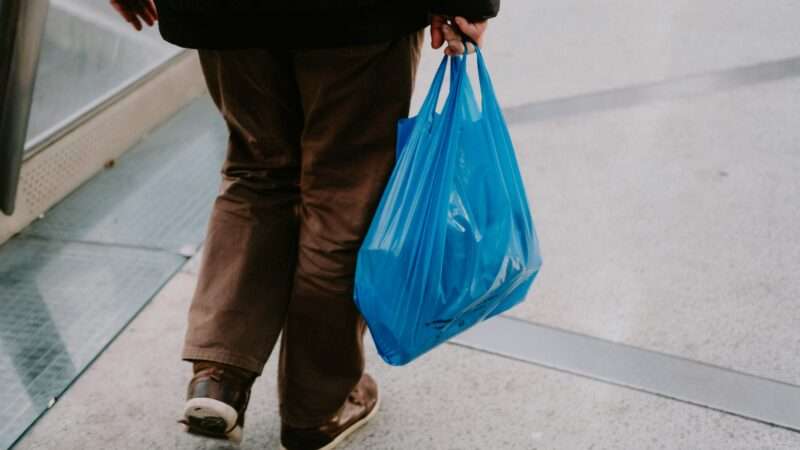
You know those scenes from old Western movies (or Bugs Bunny) where an outlaw fires his gun near someone's feet. The goal isn't to harm the target, but to make him dance to miss the bullets in an effort to frighten, humiliate or exert dominance. Think about those scenes as you consider a set of new pointless plastic-bag-related laws that seem destined just to make Californians "dance."
Remember all the hoopla in 2014 when Gov. Jerry Brown signed a "groundbreaking" law that would dramatically reduce solid waste by forbidding grocery stores from providing "single-use" plastic bags? It's been a decade since that law turned the grocery-checkout process into a grinding routine as clerks ask consumers how many bags they want to buy and cheapskate shoppers drag out bacteria-laden reusable cotton ones.
That law's backroom negotiations offer hilarious lessons in legislative sausage-making, as unions, stores, and environmentalists jockeyed for special privileges. A key compromise allowed stores to sell thicker "reusable" plastic bags, which seemed bizarre to me. The "single-use" bags actually had multiple uses. They were so thin I'd keep them to pick up dog poo and line bathroom trash cans.
By contrast, the "reusable" bags are so space-consuming that I always just pitch them in the trash. The Mercury News' Paul Rogers reported recently that this "loophole (was) inserted by some Democratic lawmakers in Sacramento who had plastic bag factories in their districts." I didn't remember that detail, but it seemed obvious that replacing thin bags with thick plastic or paper ones might not actually work out as planned.
Sure enough, the ban was a bust. Aside from adding a buck to the typical grocery bill, the plastic ban has failed to cut down on solid waste. In fact, it led to a massive increase in landfill-destined plastics. "Last year, Californians threw away more plastic bags, by weight, than when the law first passed," according to a recent New York Times article, which called it "an environmental rule that backfired and inadvertently made the matter worse."
Apparently, the California Legislature is unaware of the term, "unintended consequences." But that's not going to stop it from trying again. Two bills are now making their way through the Capitol. Senate Bill 1053 and Assembly Bill 2236 would also ban the thicker plastic bags that replaced the thinner previously-banned bags. It seems as if lawmakers want us to reuse those dirty old bags stashed in the trunk or under the seat.
But even that isn't entirely clear. As Rogers explained, Gov. Gavin Newsom "banned people from bringing their own cloth bags to stores in 2020 when the COVID pandemic first began, over fears that the virus could be transmitted by the bags." That turned out to be bunk—like everything else related to these bag-related predictions. But Californians did the dance and began using plastic bags again after that edict, as the administration required.
If a new law passes, the likely result is people like me—e.g., people who don't want to live like vagabonds and will not drag gross old bags into the store—will have no choice but to buy thick, heavy, resource-depleting paper bags. The new bills up the recyclable content requirement and require stores to charge at least 10 cents each, but leave paper as the main option. Remember that in the olden days we all used paper bags. They were replaced, in part, by the thin now-banned bags because the plastic ones were more environmentally friendly and more likely to be reused. I have no use for heavy paper bags so I'll just throw mine into the landfill.
"Manufacturing a paper bag takes about four times as much energy as it takes to produce a plastic bag, plus the chemicals and fertilizers…create additional harm to the environment," explains National Geographic. "(F)or a paper bag to neutralize its environmental impact compared to plastic, it would have to be used anywhere from three to 43 times." Given that paper bags aren't very durable, "it is unlikely that a person would get enough use out of any one bag to even out the environmental impact."
A decade from now a new set of lawmakers surely will propose a ban on paper bags after they start clogging up the landfills. Despite their grandiose rhetoric about saving the Earth, these lawmakers are smart enough to know such efforts aren't going to measurably improve the environment or reverse climate change. At this point, it's a safe guess the new ban will actually make matters worse.
My cynical take is environmentalist lawmakers try to make our everyday lives as annoying as possible by banning items that we rely upon (bags, natural-gas appliances, gas-powered yard equipment, internal-combustion-engine cars) as penance for our society's affluent consumer lifestyle. It's just for show, but they have the political power so there's nothing we can do but dance.
This column was first published in The Orange County Register.
The post California Is Doubling Down on Banning Plastic Bags appeared first on Reason.com.







